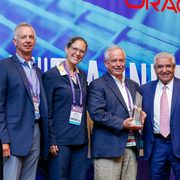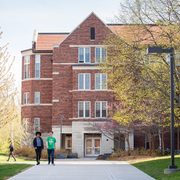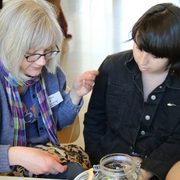-
Carleton is one of just two colleges nationwide to receive the 2019 Excellence in Sustainability Award from the National Association of College and University Business Officers (NACUBO).
-
As spring term comes to a close, we want to acknowledge and thank our four senior STAs who will be leaving the office after graduation! We are so appreciative of…
-
Carleton’s 19th annual Lighten Up Garage Sale is just around the corner!
-
The last time the college made a similar shift in its utilities was over 100 years ago when the campus—originally heated with fireplaces or coal furnaces in individual buildings—constructed the central steam plant being used today.
-
Sustainable Spring Cleaning
Spring has finally arrived, which means it’s time to do some spring cleaning! To help students clean out their closets in a sustainable way, the Sustainability Office recently hosted the Repair Fair and the Free & For Sale Frenzy. Through the Repair Fair, students were able to bring broken items including electronics, clothing, and bikes to be fixed by community members and other students. At the Free & For Sale Frenzy, students had the opportunity to sell their clothes and buy other students’ clothes, similar to a pop-up consignment shop.
Both events were huge successes, in part due to all the amazing volunteers that helped out. Personally, I got my bike repaired (it was in bad shape after the winter!) and I sold a top and got 3 new shirts! My fellow STA (Sustainability Assistant) Rebecca McCartney was similarly enthusiastic, stating, “It was a wonderful opportunity to revitalize my closet in a closed-circuit way that promotes sustainable consumerism.”
Often times, students are confused that the Sustainability Office is the organization hosting the Repair Fair and Free & For Sale Frenzy. I think this is because people do not always make the connection that repurposing items can be sustainable as they are diverted from the landfill. The main goal of these events is to disrupt the linear consumption economy–the idea that when you buy a new item, you use it until you no longer want/need it or it breaks, and then you throw it away. However, there are so many easy and creative ways to repair and repurpose items, or relocate them to other people who may have a better use for them. As the old saying goes, “one person’s trash is another person’s treasure.” This gets at the heart of the Free & For Sale Frenzy’s purpose, as an old piece of one student’s wardrobe can be a new asset to another student’s.
The Repair Fair was intended to not only help repair students’ items but also teach students how to repair things. The goal is that students learn how to fix various items, or who to reach out to if an item is broken, so they can make more sustainable consumption decisions in the future.
The Sustainability Office hopes to continue hosting both events at least once a year, due to their popular demand. In the meantime, happy spring cleaning!
-
The Repair Fair resulted in the repair of over 120 items, while the Free & For Sale Frenzy saved over 1,200 articles of clothing from the landfill.
-
The week-long effort highlights sustainability on campus and educates the Carleton community about the importance of protecting the environment.
-
Fred Rogers, vice president and treasurer; Martha Larson, manager of campus energy and sustainability; and Steven Spehn, director of facilities and capital planning, recently presented a session at the 2019…
-
Did the Superbowl bring out some football season nostalgia? Learn more about the waste contamination prevention efforts that were going on during Carleton’s home games!
If you’re a Carleton football fan, you may have noticed a few changes in Laird Stadium this fall. The tailgating area got a new triple bin, and each of the existing triple bins got a student or two (nicknamed “trash talkers” ) stationed nearby to answer questions about Carleton’s waste sorting system. Rob Nechanicky, our Custodial Services Supervisor shared some thoughts on our newest moves toward Zero Waste Athletics.
-
People often assume that composting is this impactless way of returning unlimited amounts of food waste to the earth and restarting the cycle — or that it’s impossible to produce too much waste as long as it’s compostable. This is not accurate. Facilities like this one can handle large volumes of waste, but it is currently running at capacity. Compost is a great option, but any kind of waste management is going to have an impact on the ecosystem.
Categories
- Building and Planning
- Carleton's Wind Turbines
- Climate Change
- Conferences
- Cowling Arboretum
- Ecosystem Management
- Emissions and Offsets
- Energy Sources & Uses
- Environmental Justice
- Events
- Food
- Higher Education
- International News
- National News
- News
- STA Program
- Student Life
- Student Projects
- Sustainability
- Sustainable Planning & Development
- Transportation
- Waste




